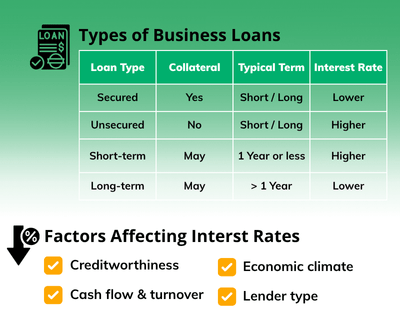Business Loan Interest Rates in South Africa (2026): How to Find the Best Deal for Your Company
June 21, 2024
Understanding Business Loan Interest Rates in South Africa
Updated in January 2026
If you’re running a business in South Africa, understanding business loan interest rates is key to borrowing wisely. Whether you’re growing your company, purchasing stock, or managing cash flow, knowing how lenders set their rates can help you secure the best possible deal.
At FatCat Loans, we make it easy for South African business owners to compare trusted lenders, explore flexible repayment options, and apply online — all in one secure platform.
As of January 2, 2026
Business loan rates in South Africa are primarily anchored to the Prime Lending Rate, which currently stands at 10.25%.
Most commercial lenders offer personalized rates based on your business’s risk profile, typically expressed as “Prime plus” or “Prime minus.”
Current Benchmark Rates (January 2026)
- Prime Lending Rate: 10.25%.
- Repo Rate: 6.75%.
- Average Bank Business Loan: 10.25% – 14.50% (estimated for low-to-moderate risk).
Rates by Business Loan Type
Interest rates vary significantly depending on the lender and the specific financial product:
- Bank Term Loans: Standard commercial banks generally offer rates ranging from Prime (10.25%) for highly creditworthy businesses up to Prime + 7% (17.25%) for higher-risk SMEs.
- Business Lines of Credit: These often carry slightly higher variable rates, typically between 12% and 20%, depending on the security provided.
- Alternative/Online Lenders: Unsecured business loans from fintech providers can range from 15% to 30% APR or more, as they often use factor rates rather than standard interest.
- Special SME Rates: Some institutions, like Absa, occasionally offer targeted SME schemes with subsidized rates as low as 10% for specific sectors (e.g., women-owned or agribusiness).
Typical Fees to Expect
Beyond interest, most South African business loans include:
Initiation Fees: Often a tiered flat fee ranging from R1,200 to R6,000+ depending on the loan size.
Monthly Service Fees: Typically between R69 and R290.
Strategic Outlook for 2026
The South African Reserve Bank (SARB) is currently in a cutting cycle. Analysts anticipate the next interest rate decision on January 29, 2026. While some expect a hold in January, further 25-basis-point cuts are widely forecasted for March and July 2026, potentially bringing the Prime rate down to 9.75% by mid-year.
Key Highlights
→ Rates vary depending on loan type, borrower creditworthiness, and lender policies.
→ Secured loans generally have lower interest rates than unsecured loans.
→ Small businesses often face higher rates due to perceived risk.
→ Alternative lenders may offer more flexible terms than traditional banks.
→ Always compare lenders and negotiate rates to get the best deal.
Understanding Business Loan Interest Rates in South Africa
Business loan interest rates in South Africa refer to the cost of borrowing money for business purposes. These rates are determined by various factors, including the South African Reserve Bank’s Monetary Policy Committee. The current prime lending rate in South Africa is 10.25%. Understanding business loan interest rates is crucial for business owners as it affects their loan repayment amounts and overall cost of borrowing. By understanding the components of business loan interest rates and the factors that influence them, business owners can make informed decisions when applying for a business loan.
The Components of Business Loan Interest Rates
Business loan interest rates in South Africa are comprised of several components. The first component is the lender’s assessment of the borrower’s creditworthiness, which includes factors such as the borrower’s credit score, financial statements, and business account. Lenders will also consider the borrower’s cash flow, which is the amount of money coming in and going out of the business. A strong cash flow indicates the borrower’s ability to repay the loan. Additionally, the borrower’s annual turnover, which is the total revenue generated by the business in a year, may also be considered. Lenders may also take into account the borrower’s banking history, including the length and activity of their bank account. All these components are considered to determine the interest rate for a business loan.
How Interest Rates Impact Your Loan Repayment
Interest rates play a significant role in determining the loan repayment amount for business loans. The interest rate, along with the loan amount and repayment term, determines the monthly or periodic repayment amount. A higher interest rate will result in a higher repayment amount, while a lower interest rate will result in a lower repayment amount. The repayment structure, which can be fixed or variable, also affects the loan repayment. Fixed interest rates provide stable repayment amounts throughout the loan term, while variable interest rates may fluctuate based on market conditions. The type of finance, such as term loans or lines of credit, can also impact loan repayment. Additionally, the availability of working capital can affect the borrower’s ability to make timely loan repayments.
Types of Business Loans Available in South Africa
In South Africa, there are various types of business loans available to meet different financing needs. Secured loans require collateral, such as property or equipment, to secure the loan. These loans often have lower interest rates due to the reduced risk for the lender. Unsecured loans, on the other hand, do not require collateral but may have higher interest rates to compensate for the increased risk. Additionally, business loans can be categorized as short-term or long-term, with short-term loans typically having a repayment term of up to one year and long-term loans having a repayment term of more than one year. Medium-term loans fall in between, with a repayment term of one to five years.

How to Find the Best Business Loan Rates
Comparing lenders is essential. Evaluate banks versus non-banking financial companies for favourable rates. Negotiating with your lender can lead to better terms. Understanding the market and different lenders’ criteria is crucial in securing lower interest rates.
Comparing Lenders: Banks vs. Non-Banking Financial Companies
When comparing lenders for business loans, business owners have the option to choose between traditional banks and non-banking financial companies (NBFCs). Traditional banks, such as Standard Bank, FNB, and ABSA, are well-established institutions that offer a wide range of financial products, including business loans. These banks often have strict eligibility criteria and may require collateral for business loans. On the other hand, NBFCs, which include alternative lenders and fintech companies, offer more flexible lending options and may have faster application and approval processes. These lenders often focus on assessing the borrower’s creditworthiness based on alternative data sources, such as cash flow statements and online transaction histories. Business owners should consider their specific needs and preferences when comparing lenders to find the best fit for their business loan requirements.
Negotiating for Better Rates with Your Lender
Negotiating with your lender can help you secure better rates for your business loan. Before entering into negotiations, gather all the necessary information about your business, such as financial statements and annual turnover. Present a strong case to the lender, highlighting your creditworthiness and repayment capacity. Emphasize your business’s positive financial performance and growth potential. If applicable, offer collateral to reduce the lender’s risk and potentially secure a lower interest rate. Additionally, consider the repayment amounts and discuss any flexibility or discounts available. By demonstrating your business’s value and repayment capacity, you can increase your chances of negotiating better rates with your lender and secure a more favourable loan agreement.
Preparing Your Business for a Loan Application
Preparing your business for a loan application is essential to increase your chances of success. Start by understanding your financial needs and determining the type of loan that best fits those needs. Gather all the necessary documents, including financial statements, income statements, and a well-prepared business plan. Ensure that your financial records are accurate and up to date. Review your credit score and take steps to improve it if necessary. By being prepared and organized, you can streamline the application process and present a strong case to lenders, increasing your chances of securing a business loan.
Essential Documents You Need to Apply
When applying for a business loan in South Africa, there are several essential documents that you will need to provide to the lender. These documents help the lender assess the financial health and viability of your business. Some of the essential documents include balance sheets, which provide a snapshot of your business’s assets, liabilities, and equity at a specific point in time. Income statements, also known as profit and loss statements, show the revenue, expenses, and net income or loss of your business over a specific period. And finally, registration documents such as your business registration certificate are required to prove the legal existence of your business. By having these documents ready and in order, you can streamline the application process and increase your chances of securing a business loan.
Improving Your Business’s Financial Health
Improving your business’s financial health is essential when applying for a business loan. One area to focus on is managing your cash flow effectively. This involves monitoring your incoming and outgoing cash and ensuring that you have enough liquidity to cover your expenses and debt obligations. Another important factor is maintaining a good credit score, as lenders often consider this when determining loan eligibility and interest rates. Paying bills on time and managing your debts responsibly can help improve your creditworthiness. Additionally, considering a business term loan can be beneficial for your business’s financial health. This type of loan provides a lump sum of money that can be used for various purposes, such as expanding operations or purchasing equipment. By improving your cash flow, credit score, and considering a business term loan, you can strengthen your business’s financial health and increase your chances of securing a business loan.
The Application Process for Business Loans
The application process for business loans in South Africa involves several steps, starting with the interaction between the lender and the borrower. The lender will typically provide the borrower with an application form to complete, which will require information about the business, its financials, and the purpose of the loan. The lender will then review the application and assess the borrower’s creditworthiness. This may include checking the borrower’s credit score and financial history. Once the lender has reviewed the application and conducted any necessary due diligence, they will make a decision on whether to approve or decline the loan.
Step-by-Step Guide to Applying
Applying for a business loan in South Africa can seem overwhelming, but following a step-by-step guide can help make the process easier. The first step is to understand the application process, which typically involves filling out an application form provided by the lender. Next, ensure that your business is registered and has all the necessary documentation in place. This includes your business registration certificate and any other legal documents required by the lender. Additionally, having a dedicated business account can help streamline the application process and demonstrate the financial stability of your business. By following these steps, you can navigate the application process more effectively and increase your chances of securing a business loan.
Common Mistakes to Avoid in the Application Process
When applying for a business loan in South Africa, it’s important to avoid common mistakes that can hinder your chances of approval. One common mistake is providing incomplete or inaccurate information on the loan application form. This can lead to delays in the approval process or even a rejection. Another mistake is not considering the specific requirements of the lender. Each lender may have different eligibility criteria and documentation requirements, so it’s essential to understand and meet these requirements. Finally, it’s important to carefully review and understand the terms and conditions of the loan before signing any agreements. By avoiding these common mistakes, you can increase your chances of a successful application for a business loan.
Repaying Your Business Loan
Repaying your business loan is an important aspect of the borrowing process. Understanding the repayment structure, including the terms and conditions, is crucial to ensure timely and successful repayment. This includes knowing the repayment amounts, whether they are fixed or variable, and the frequency of payments. It’s also important to consider any additional fees or penalties that may be associated with early repayment or missed payments. By understanding the repayment structure and planning accordingly, you can effectively manage your loan repayment and maintain a positive relationship with your lender.
Understanding Repayment Terms and Conditions
When taking out a business loan in South Africa, it’s important to understand the repayment terms and conditions. This includes the repayment structure, which outlines how the loan will be repaid, such as fixed monthly payments or variable payments based on business performance. The loan term is another important factor to consider, as it determines the length of time you have to repay the loan. Additionally, understanding the repayment amounts, including any interest or fees, is crucial for budgeting purposes. By fully understanding the repayment terms and conditions, you can effectively manage your loan and ensure timely repayment.
Strategies for Efficient Loan Repayment
Efficiently repaying your business loan is essential for maintaining financial stability and a positive relationship with your lender. One strategy is to carefully manage your cash flow to ensure that you have sufficient funds to make timely loan repayments. This may involve closely monitoring your income and expenses, and making adjustments as necessary. Additionally, understanding the repayment structure of your loan, such as any fixed or variable repayment amounts, can help you plan and budget accordingly. Having a dedicated business account can also assist with loan repayment, as it allows you to separate your personal and business finances and track loan payments more easily. By implementing these strategies, you can ensure efficient loan repayment and maintain financial stability for your business.
Alternatives to Traditional Business Loans
In addition to traditional business loans, there are alternative funding options available for South African entrepreneurs. These alternatives include government grants, which provide financial support to eligible businesses for specific purposes, such as research and development or job creation. Another option is angel investors, who provide capital to early-stage businesses in exchange for equity or ownership stakes. Venture capital is another alternative, where investors provide funding to high-growth start-ups in exchange for equity. Exploring these alternative funding options can provide additional opportunities for financing and growth for South African businesses.
Exploring Government Grants and Funding
Government grants and funding can be a valuable source of financing for South African businesses. These grants are typically provided by government agencies and aim to support specific sectors or industries. They can be used for various purposes, including research and development, job creation, and skills development. Additionally, some government grants offer tax incentives, such as exemptions from value-added tax (VAT) or reduced tax rates. By exploring government grants and funding opportunities, businesses can access additional capital and support to help them grow and succeed in the South African market.
The Role of Angel Investors and Venture Capital
Angel investors and venture capital play a crucial role in funding start-ups and early-stage businesses in South Africa. Angel investors are individuals or groups who provide capital to start-ups in exchange for equity or ownership stakes. These investors often bring valuable expertise and mentorship to the businesses they invest in. Venture capital, on the other hand, refers to funds provided by investment firms to high-growth start-ups. These funds are typically used to fuel rapid expansion and scale. Both angel investors and venture capital can provide the necessary funding and support for start-ups to overcome early-stage challenges and achieve long-term success.
The Future of Business Financing in South Africa
The future of business financing in South Africa is being shaped by emerging trends and technologies. Financial technology, or fintech, is playing a significant role in transforming the lending landscape. Fintech companies are leveraging technology to provide faster, more accessible, and more efficient lending solutions to businesses. Additionally, lending trends are evolving to meet the changing needs of businesses, such as increased demand for online lending and alternative funding options. The rise of e-commerce is also influencing business financing, as online businesses require specialized financing solutions. By embracing these trends and technologies, South African businesses can access innovative and tailored financing options.
Trends in Lending and Interest Rates
Lending trends and interest rates in South Africa are influenced by various factors, including the economic climate and market conditions. Trends in lending may include changes in loan application processes, increased use of technology in loan processing, and a shift towards alternative lending options. Interest rates, on the other hand, are influenced by factors such as inflation, monetary policy decisions, and economic indicators. Businesses should stay informed about these trends and rates to make informed decisions when seeking financing. By understanding the current lending landscape and interest rate environment, businesses can better navigate the borrowing process and secure favourable financing terms.
Innovations in Financial Technology and Their Impact
Financial technology, or fintech, is revolutionizing the business financing landscape in South Africa. Fintech companies are leveraging technology to streamline and simplify the lending process, providing businesses with faster and more accessible financing solutions. One innovation in fintech is the development of mobile apps that allow businesses to apply for loans and manage their finances on the go. These apps provide a user-friendly and convenient online experience, making it easier for businesses to access the funds they need. Additionally, online platforms are enabling businesses to compare loan options, apply online, and receive funding quickly. These innovations are transforming the business financing experience and making it more efficient and user-friendly for South African entrepreneurs.
Frequently Asked Questions
What is the average business loan interest rate in South Africa?
The average business loan interest rate in South Africa is determined by the South African Reserve Bank’s Monetary Policy Committee. As of February 2026, the current prime lending rate is 10.25%. This interest rate is used by banks and financial institutions to calculate the cost of borrowing for businesses. It is important to note that individual lenders may offer different interest rates based on their own risk assessment and terms and conditions.
Can start-ups qualify for business loans with favourable rates?
Start-ups can qualify for business loans with favourable rates, but it depends on several factors. Lenders typically consider the credit score of the business and its owners, as well as the terms and conditions of the loan. Start-ups with a strong credit score and a solid business plan may be able to secure business loans with lower interest rates. However, each lender has its own criteria and risk assessment process, so it is important for start-ups to research and compare different lenders to find the best rates and terms for their specific needs.
How do I calculate the total cost of a business loan?
The total cost of a business loan can be calculated using a business loan calculator. This tool takes into account the loan term, interest rate, and repayment amounts to determine the overall cost of borrowing. By entering these details into the calculator, businesses can get an estimate of the total amount they will repay over the loan term. This calculation can help businesses plan their finances and make informed decisions about taking out a business loan.
Are there fixed-rate business loans available in South Africa?
Yes, there are fixed-rate business loans available in South Africa. These loans provide businesses with a consistent repayment structure and interest rate over the loan term. With a fixed-rate business loan, the interest rate remains the same throughout the repayment period, making it easier for businesses to budget and plan their finances. This type of loan is popular among businesses that prefer stability and want to avoid fluctuations in interest rates.
What are some common fees associated with business loans?
There are several common fees associated with business loans. These fees may vary depending on the lender and the specific loan terms. Common fees include application fees, which are charged for processing the loan application, as well as registration fees for registering the loan with the appropriate authorities. Lenders may also charge other fees for services such as credit checks, legal documentation, or early repayment. It is important for businesses to review and understand all the fees associated with a business loan before agreeing to the terms.
Conclusion: Take Control of Your Business Financing
Getting the right business loan interest rate can make a big difference to your company’s growth and financial health. By comparing offers and understanding how rates are calculated, you can save money, improve cash flow, and borrow confidently.
At FatCat Loans, we connect South African entrepreneurs with reputable lenders offering fair, transparent, and flexible business loans. No hidden fees, no endless paperwork — just smart financial solutions that work for your business.
Ready to Compare Business Loan Interest Rates in South Africa?
👉 Explore the best business loan interest rates today through FatCat Loans and find financing that helps your business grow — fast, easy, and 100% online.
Disclosure: This article is for informational purposes only and does not constitute financial advice. Loan terms, rates, and eligibility vary by lender and province. FatCat Loans is a loan comparison platform, not a lender. Always review lender agreements carefully before accepting a loan.

The FatCat Loans Editorial Team delivers clear, accurate, and unbiased guidance on loans, credit, and personal finance in South Africa, in compliance with the National Credit Act. Our writers follow strict editorial standards to ensure every article is trustworthy, well-researched, and easy to understand, helping readers make confident financial decisions.




